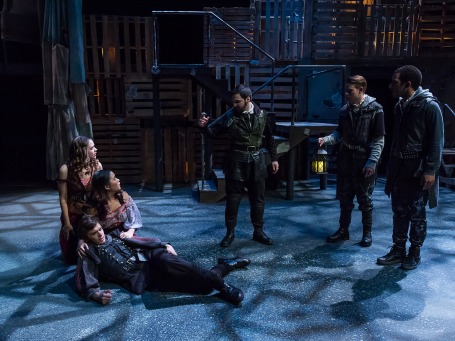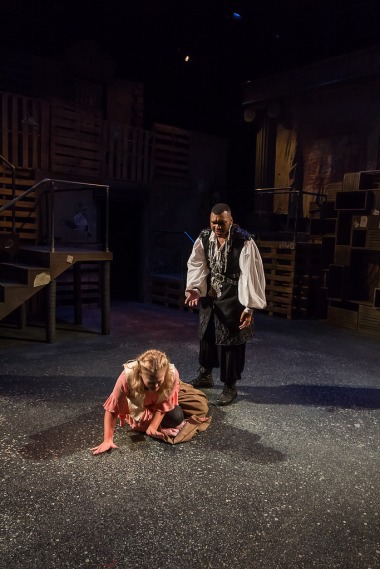“Oh brave new world that has such people in it!”
April 18, 2017 § Leave a comment
It would take quite a long time for me to simply list every reference to Shakespeare in Aldous Huxley’s Brave New World, let alone analyze the significance of them. Honestly I don’t think I would even be able to find all of them, even with a re-reading of the book. Over the course of the novel, John the Savage directly references Antony and Cleopatra, Hamlet, King John, King Lear, Macbeth, A Midsummer Night’s Dream, Othello, The Phoenix and the Turtle (a lesser known allegorical poem written by Shakespeare), Romeo and Juliet, The Tempest, Timon of Athens, Troilus and Cressida, and Julius Caesar.
Shout out to Wikipedia for that list.
The most overtly referenced of Shakespeare’s plays is, of course, The Tempest (I say “of course” but if you haven’t read The Tempest it is very understandable that you wouldn’t catch onto this). In fact the very title of the novel “Brave New World” is a reference to The Tempest:
O, wonder!
How many goodly creatures are there here!
How beauteous mankind is! O brave new world
That has such people in’t!
(The Tempest; Act V, Scene I)
(Brave New World; 129-30, 148, 174)
I have seen rather compelling arguments that Brave New World is basically just one massive allusion or parody of The Tempest. Alas, as I have seen them, I probably shouldn’t write about that (although it’s really quite interesting, I’d encourage you to look it up if you have free time/you really enjoy tragic Shakespearian parodies).
As this blog post must necessarily be finite in length, I am choosing to focus on the influence of just one of Shakespeare’s works. One slightly less obvious than The Tempest (though, admittedly, still somewhat overt).
OTHELLO
Of all the Shakespearian characters John could choose as a role model, he has to go with Othello. This is understandable, in a way: John has good reason to identify with the Moor. John grew up as the only white man on the Native American Reservation. He left the Reservation only to yet again become an outcast in society. Similarly, Othello is a black man in a white-dominated society
I’m not going to say Othello is an all around terrible character. There’s a lot to be said for how he built himself up and gained a notable position in society in spite of the constant racism surrounding him. However, by the end of his namesake play he is undeniably The Worst™. Othello allows himself to be manipulated by Iago (admittedly rather brilliantly) into thinking his wife, Desdemona, is cheating on him. He reacts to this information by *spoiler alert* murdering Desdemona in her bed.
This is John’s #1 role model.
Historically, Shakespeare’s plays actually do have their fair share of strong female characters (especially for the time in which they were written). Othello is not a great representation of this fact. You have three female characters: Desdemona, Bianca, and Emilia. The only one of these three who I would truly describe as a notably “strong female character” is Emilia (married to Iago, who, in spite of my previous anger towards Othello, is honestly The Actual Worst™).
While Othello does have the one strong female character (at least in my opinion), the treatment of women in this play is absolutely horrific. Here’s a very spoilery breakdown: You have Desdemona, aforementioned wife of Othello, an absolute jewel of a human who is murdered in her bed by her husband. You have Emilia, aforementioned wife of Iago, who is also murdered by her husband. Lastly, you have Bianca, a Venetian courtesan unrequitedly in love with Cassio, who is eventually wrongly accused of attacking him in the street (in VUTheatre’s production of Othello, as well as in many stagings of the play, Bianca was raped and presumably murdered in this scene. As Katherine Ko, actress who portrayed Bianca, explained: “It just shows that it sucked to be a woman because Bianca was a major pawn in the whole handkerchief shindig, and it was like after Iago didn’t need her anymore he just fed her to the dogs”).

(Above: Act V, Scene I of VUTheatre’s 2016 production of Othello. Bianca (Kat Ko) holds a wounded Michael Cassio (Scottie Szewczyk). Iago (Cole Carlin, center), accuses her of attacking him. Photo credit: Phillip Franck.)
It is widely believed that Shakespeare was making something of a feminist commentary with the treatment of women in Othello. I think it’s safe to say that John did not pick up on this.
John’s dialogue in chapter 13 of Brave New World, where Lenina comes on to him and he reacts rather violently, is approximately 74% (I made this number up, but it was a lot) from Act IV, Scene II of Othello. This scene has Othello furiously confronting Desdemona about her “infidelity”.
Was this fair paper, this most goodly book,
Made to write ‘whore’ upon? What committed!
Committed! O thou public commoner!
…
Impudent strumpet!
Othello (IV, II)
Brave New World (177, 178)

(Above: Act IV, Scene II of VUTheatre’s production of Othello. Othello (Cameron Williams) confronts Desdemona (Emma Dwyer) after Iago accuses her of infidelity. Photo credit: Phillip Franck.)
Basically what I’m getting at is that Othello as a play can, in some ways, be read as “How Not to Treat Women: A Play by William Shakespeare”. John reads Othello and seemingly romanticizes the protagonist, taking the play as “How Women Should be Treated: A Guide to Relationships”.
I am not in any way trying to justify John’s actions, but I do think that he becomes a more sympathetic character when you take into account the huge impact literature has had on his life. He grew up without a father figure, with a mother who resented him, and very few other personal relationships. His primary relationships were with fictional, Shakespearian, characters. Is it really any wonder that their (sometimes convoluted) values rubbed off on him?
By: Olivia Peel (To make up for missing discussion)
Sources:
https://en.wikipedia.org/wiki/List_of_quotes_from_Shakespeare_in_Brave_New_World
Huxley, Aldous. Brave New World. New York: Harper Perennial, 2010. Print.
Shakespeare, William, and Robert Woodrow Langbaum. The Tempest. New York: New American Library, 1988. Print.
Shakespeare, William, and Alvin Kernan. Othello. New York: Signet, 1998. Print.
